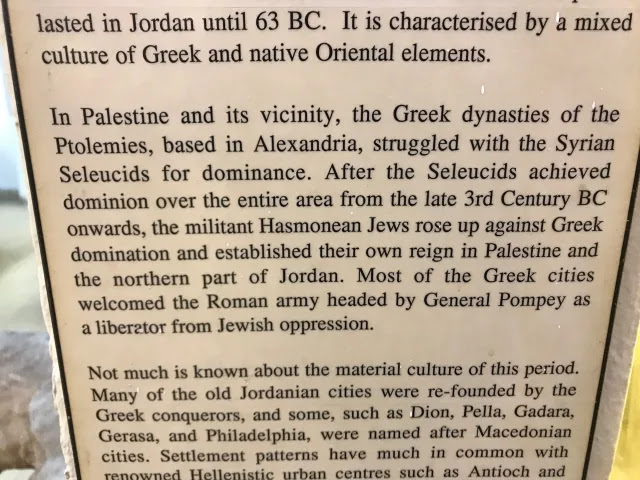The only mention he found of the word "Jewish" in any of the many Jordanian sites that used to be part of the Judean kingdom was this reference to "Jewish oppression:"
A map (found in a hotel in Amman) of the ancient area replaces Judah and Israel with Palestine and doesn't mention that any part of Jordan was actually part of Jewish "Palestine", artificially using the Jordan River to delineate the two areas:
Sacks goes on:
At the renovated museum at Petra, one can find another depiction of Judea as a ruthless, imperialist state:Jordan's peace treaty with Israel is now almost 25 years old.
Aretas II first minted coins, during his reign Alexander Janneus was King of Judah and he was a ruthless ruler who sought to expand and strengthen the territories of Judah. Around 100 BC he took control of Gaza and though the people of Gaza asked for Aretas help it came too late.
Thus the Jewish kingdom of Judah is described not just as oppressive but also as led by a "ruthless" ruler. The echo of a beleaguered and besieged Gaza is hard to not to cross-reference against contemporary events. It would be surprising if the effect were entirely unintentional.
Describing the peaceful, wealthy and diplomatic regime of the proto-Arabic Nabatean trading peoples (who spoke a Semitic language and migrated from the Arabian peninsula over centuries) in contrast to the warlike, expansionist Herodians, the permanent exhibit at Petra goes on to recount:
King Herod the great invaded twice second time taking control of large parts of the country… Aretas IV whose daughter married Herod Antipas, son of Herod the Great. Herod Antipas later divorced Phasaelis in order to marry his brother’s wife Herodias, mother of the famed Salome, who danced for Herod and in return asked for the head of John the Baptist on a platter. The shamed Phasaelis fled back home to Petra, escorted by Nabatean guard. Aretas, IV angered by the snub, sent an army to invade Herod’s territory and captured large parts of it along the west bank of the Jordan river.
So it appears that duplicity and decadence can be added to the cycle of war, revenge and retribution between the Judeans and the proto-Arabs in the last century BCE. Added to this is a reference to the infamous tale of Salome and John the Baptist, which could plausibly be considered one of the foundational narratives of Christian and global anti-Semitism.
Some "peace."
(h/t Yoel)

 Elder of Ziyon
Elder of Ziyon























